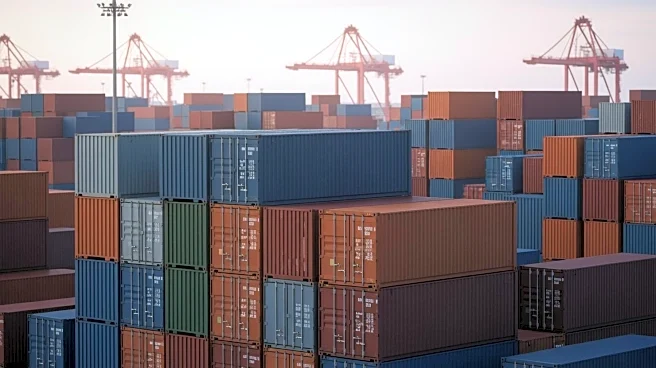What's Happening?
The U.S. Trade Representative (USTR) has implemented a new port fee program that is drawing criticism for its classification system, which some argue is flawed. Andrew Abbott, CEO of Atlantic Container Line (ACL), highlighted the issue during an interview
with CNBC, describing it as a 'bureaucratic blind spot.' The program classifies ACL's vessels as Roll-on/Roll-off (Ro-Ro) despite 80% of their cargo being containers. This misclassification could result in ACL facing fees of up to $34 million annually, which Abbott deems unsustainable. The USTR decided to base fees on net tonnage rather than the number of units aboard vessels, increasing the fee to $46 per net ton. Abbott argues that ACL's ConRo vessels, which have been recognized as containerships, should not be treated as Ro-Ro under the U.S. program. The misclassification could force ACL to consider relocating operations outside the U.S.
Why It's Important?
The USTR's port fee program has significant implications for the shipping industry, particularly for companies like ACL that operate unique vessel types. The increased fees could lead to higher operational costs, potentially affecting the pricing and availability of shipping services for American manufacturers and exporters. If ACL and similar companies are forced to relocate operations, it could disrupt supply chains and increase costs for U.S. businesses relying on imported goods and materials. The situation underscores the importance of accurate classification systems in regulatory programs to avoid unintended financial burdens on businesses. The broader impact could include reduced competitiveness of U.S. ports and increased reliance on alternative shipping methods, which may not offer the same efficiency or cost-effectiveness.
What's Next?
ACL may need to reassess its operational strategy if the USTR does not address the classification issue. Abbott has indicated that the company might consider redeploying its operations outside the U.S. if the fees remain unchanged. This decision could have ripple effects on the shipping industry and U.S. export markets. Stakeholders, including shipping companies and industry groups, may lobby for changes to the program to ensure fair treatment of vessels based on their actual cargo and operational characteristics. The USTR's response to these concerns will be crucial in determining the future landscape of U.S. port operations and international shipping relations.
Beyond the Headlines
The controversy surrounding the USTR port fee program highlights broader issues of regulatory oversight and the need for adaptive policies that reflect the complexities of modern shipping operations. The reliance on international classification systems may not adequately account for the diverse nature of cargo and vessel types, leading to potential misalignments in policy implementation. This situation could prompt discussions on the need for more nuanced regulatory frameworks that consider the evolving nature of global trade and transportation. Additionally, the financial strain on companies like ACL could lead to increased scrutiny of government programs and their impact on business viability and economic growth.















